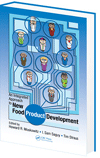Why Food Will Continue To Get Safer
Food safety experts on the front lines talked to FutureFood 2050 this month about the most promising weapons in the fight to make the food supply safer

From E. coli to salmonella, the headline-grabbing pathogens that can contaminate our food supply are meeting their match, thanks to an array of technology advancements that will impact both food producers and consumers, say food safety research and policy leaders.
The World Health Organization (WHO) is planning to release its long-awaited research on the global burden of foodborne diseases in 2015, but ongoing data from the U.S. Centers for Disease Control and Prevention (CDC) already paint a stark picture: One out of every 6 people in the United States suffers from a foodborne illness every year, and within that group 128,000 people are hospitalized, and 3,000 die. Reducing those numbers is the goal of an army of food safety researchers and thought leaders investigating everything from DNA "fingerprinting" techniques to packaging indicators that tell consumers whether the product inside is safe to consume, according to the latest series of interviews from the Institute of Food Technologists (IFT) FutureFood 2050 publishing initiative. FutureFood 2050 explores how increasingly sophisticated science and technology will help feed the world's projected 9 billion-plus people in 2050.

|
"Regulatory agencies and food companies have much better resolution and ability today to track specific strains of organisms than they did a decade ago," says Robert Brackett, director of the Illinois Institute of Technology's Institute for Food Safety and Health. "Whole-genome sequencing [for example] is helping regulatory agencies identify discrete problems much more precisely. Beyond simply showing that there's salmonella in a food sample, we can show that it came from a certain factory in a specific place," he adds.
Food safety experts on the front lines talked to FutureFood 2050 this month about the most promising weapons in the fight to make the food supply safer, including:
• Robert Brackett: Director of the Illinois Institute of Technology's Institute for Food Safety and Health, who predicts that new gene-based tools will help pinpoint foodborne illness outbreaks in record time
• Will Daniels: Fresh produce safety expert who says a variety of technology advancements are cleaning up contamination risks from farm to table
• Chris Elliott: UK food fraud researcher who's waging a war against criminal threats to the global food supply
• Liu Xiumei: Pioneering food safety expert in China, who sees pollution issues as the country's biggest challenge in improving food safety
• William Marler: Veteran food safety attorney who believes consolidating regulatory agencies is essential for better oversight
• Steve Taylor: Biochemist who co-founded the Food Allergy Research and Resource Program to support cutting-edge research on food allergies
FutureFood 2050 is a multi-year program highlighting the people and stories leading the efforts in finding solutions to a healthier, safer and better nourished planet to feed 9 billion-plus people by 2050. Through 2015, the program will release 75 interviews with the world's most impactful leaders in food and science. The interviews with food safety leaders are the 12th installment of FutureFood's interview series, following sustainability, women in food science, food waste, food security and nutrition in Africa, aquaculture, futurists on food, innovative agriculture Parts 1 and 2, kitchens of the future, obesity, and alternative proteins.
Early next year, FutureFood 2050 will also debut a documentary film exploring how the science of food will contribute solutions to feeding the world. Here's a behind-the-scenes interview with the film's director.
For more information, please visit FutureFood2050.com to subscribe to monthly updates, learn more about the project and read the latest news on food science.
Looking for a reprint of this article?
From high-res PDFs to custom plaques, order your copy today!








